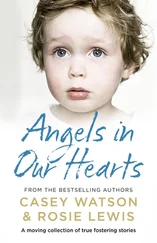“Christine,” Josephine said. She spoke before she realized that her words were more than thought. “I think I’m going blind.”
Christine looked up wearily. She reached the hand with the broken finger over to rub Joe’s back awkwardly.
“Never mind,” Josephine said.
“At least it’s only one finger,” Christine said firmly. The adhesive tape of the splint scratched up and down Joe’s sweater, snagged, and moved on.
Josephine’s shoulders stiffened with embarrassment. She’d wanted Christine to jump up from the couch in horror, fluff the couch pillows for Josephine to lay her head. “Blind?!” The blood rushed to her face, heating it up from the inside out.
Josephine was nothing like that doctor in Haiti — she wandered out into the squashed-down world looking for comfort from the people she should be comforting. Christine flipped her arm over to scratch her wrist with the splint and Josephine had a sudden murderous impulse to cut the wrist Christine offered up, to see real blood. She shook her head to empty her mind of the image. She would go home and call Eli. He would straighten her out. “Pull the shades, Jo,” he’d say. “Make a cup of tea. Take a nap. Be kind to yourself.”
Last night Josephine had found brief comfort on a late-night public TV talk show. A guest scientist had warned against the dangers of bowing down to genetic determinism. And yet all this talk about genomes — how could they not, in addition to everything else, dictate human behavior? That’s what the talk show host had said, striking a thoughtful pose, hand on his chin as if he were in the midst of discovering something himself. The trick, Josephine thought, was to arm yourself with your own life philosophies, to learn to tell your own narrative in a way that allowed you to influence your own evolutionary path. My mother lost her mind so I didn’t have to. The fact that I’m aware of the danger makes it that much more preventable. Yeah, my father left — it made me strong, independent, self-sufficient. No, I didn’t feel abandoned, actually . She had these conversations frequently with imaginary dissenters, who often took the form of the late-night talk show host. He’d ask challenging questions, that hand on his chin. But Josephine, you’ve had moments where you too wanted to retreat to your bed. Long naps in the afternoon, yes? Your work — is it guilt that motivates you? And how about this Eli? He has made it clear that he loves you, and yet you refuse to even discuss the possibility of marriage. What is this about? Perhaps you are afraid you will drive him away the way your mother did your father? Oh, shut up, she told herself.
“Call me if you need anything,” Josephine said to Christine, knowing Christine never would. Then she had an inspiration. She wrote her home phone number on a piece of paper and slipped it into Christine’s good hand.
“What’s this?” Christine asked.
“My home number.”
“Am I supposed to be grateful?”
Get set , the spiders whispered.
Back at her office, Josephine took herself to task for giving a client her home phone number. She shouldn’t foster dependency. She’d gone to social work school after her mother died to be able to give something to people who wanted to receive it. At first that provided a joyous, mind-expanding satisfaction, which then became more of a cleaning-the-house kind of satisfaction. Clean laundry folded neatly in drawers; kitchen counter wiped clean; a bathroom that smelled of fake-smelling flowery disinfectant; groceries unpacked, refrigerator arranged so that the levels of food made sense, cans carefully stacked in the cupboard. A now-that’s-done kind of satisfaction. She knew she’d shut herself down, wrapped herself in the snappy maxims she offered the women she counseled—“Take care of yourself; no one else will,” or “You can’t undo your past.” It kept their sadness from seeping through. Now that felt wrong — she should feel some of that pain. This talk with herself wasn’t having the desired effect.
She thought about calling Eli, then decided against it. His kindness infuriated her. “You need a break,” he’d say as he often did, level-headed and calm. His solutions infuriated her.
“You’ll be like this someday, no matter how hard you try,” her mother had said to her, always quietly (so much better when she screeched), after her father fled. This was before her mother stopped leaving the house altogether, when she still faked fainting spells in movie theaters. Josephine would throw down her popcorn to come to her rescue. That’s what she wanted, wasn’t it? Or was it? Kindness infuriated her too, and solutions enraged her. In a train station once, she thought she was going deaf because the clerk behind the counter began to speak as a train pulled into a station. Josephine, excited by how easy this round of reassurance would be, pointed to the train, something tangible, something right there in front of them. She laughed with relief.
“You think this is funny?” her mother had said. “I’m in pain here.”
“I know that,” she said. “I know.”
“I wish I would go deaf so you could see the thing devouring me from inside.”
“That’s a horrible thing to say,” Josephine said, packing her bags in her mind. “Never think it again or it might come true.”
“I wish it would,” she said, and Josephine unpacked her mental luggage once more, feeling the inevitable tug of guilt in the blood they shared.
Josephine canceled her next appointment and went home, where she lay down on her bed. She fell asleep and had a dream in which she walked around and around her own squat house, crowded together among the other one-story houses in the neighborhood for protection, plucking bits of flaking paint to reveal a different color underneath. As she walked, she realized she couldn’t remember what day it was, whether it was yesterday or today or tomorrow or next year.
“It’s Wednesday,” the two girls who lived across the street told her, running through her dream. She woke up, frightened by the blur of her days. She opened her bedroom closet, where her clothes hung like molted skins. There were no groceries, nothing to eat for dinner. This fact pleased her. Over the hum of the refrigerator she listened with satisfaction to the rumbling of her stomach. She thought of the tin cans — peas, corn, beans — in the cabinet, in front of other, dusty cans of hominy, beets, things that sat untouched for years, good ideas at the time. She went into the kitchen and put them in a paper bag. She would take them to the emergency food pantry. It was time to admit she would never, in the entire rest of her life, eat them. She put the paper bag on the kitchen floor, then lay down beside it on the cold linoleum until she could feel darkness surround the house.
She smelled Richmond before she heard him — that musky smell, a parody of what a man should be. He didn’t knock. He pushed open the door, which she’d forgotten to lock in her haste to get inside, away from the world. Nothing happens by accident, she remembered telling Christine last week. He walked into the kitchen and found her there on the floor.
“Theresa’s not home yet,” he said.
Josephine started to get up, and then the same part of her that had wanted to see Christine’s blood decided against it. “She’s been working late these days.”
“I know,” Richmond said, and lay down beside her. Josephine had crawled into bed with her mother once. She had too much to drink one night and slipped in beside her after she’d finally fallen asleep. Her mother’s body stiffened like a rod as soon as Josephine lay down, but Josephine persevered. She put an arm around that rod and kept it there all night.
Читать дальше












